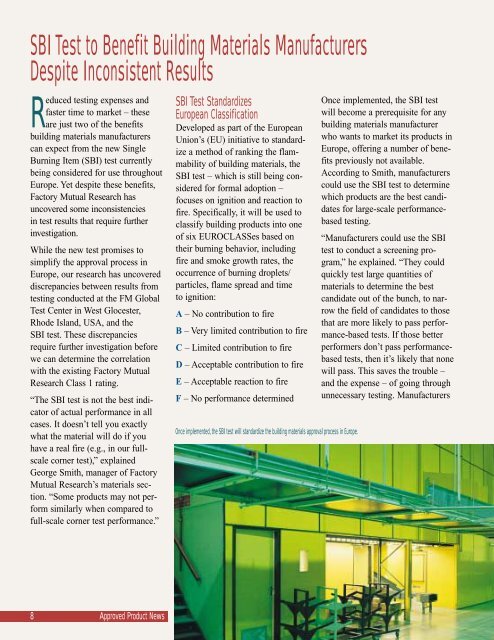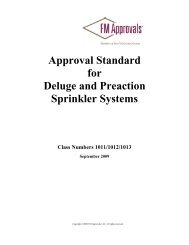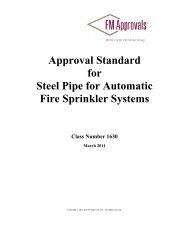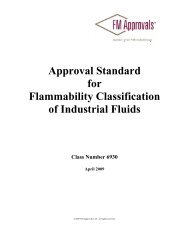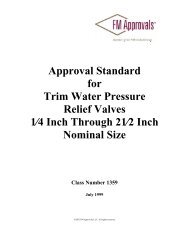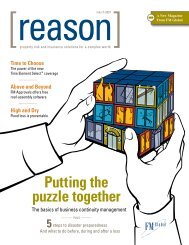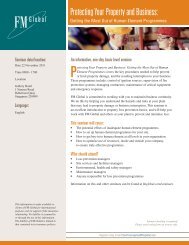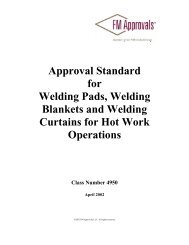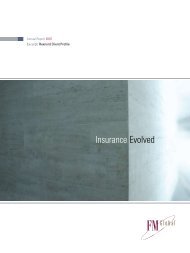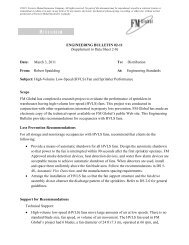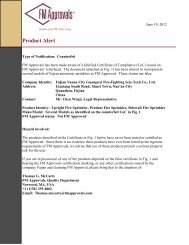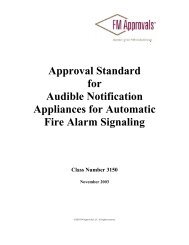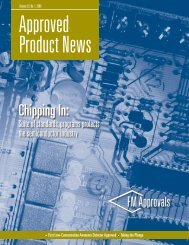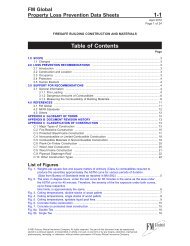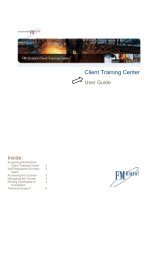Approved Product News - FM Global
Approved Product News - FM Global
Approved Product News - FM Global
Create successful ePaper yourself
Turn your PDF publications into a flip-book with our unique Google optimized e-Paper software.
SBI Test to Benefit Building Materials Manufacturers<br />
Despite Inconsistent Results<br />
Reduced testing expenses and<br />
faster time to market – these<br />
are just two of the benefits<br />
building materials manufacturers<br />
can expect from the new Single<br />
Burning Item (SBI) test currently<br />
being considered for use throughout<br />
Europe. Yet despite these benefits,<br />
Factory Mutual Research has<br />
uncovered some inconsistencies<br />
in test results that require further<br />
investigation.<br />
While the new test promises to<br />
simplify the approval process in<br />
Europe, our research has uncovered<br />
discrepancies between results from<br />
testing conducted at the <strong>FM</strong> <strong>Global</strong><br />
Test Center in West Glocester,<br />
Rhode Island, USA, and the<br />
SBI test. These discrepancies<br />
require further investigation before<br />
we can determine the correlation<br />
with the existing Factory Mutual<br />
Research Class 1 rating.<br />
“The SBI test is not the best indicator<br />
of actual performance in all<br />
cases. It doesn’t tell you exactly<br />
what the material will do if you<br />
have a real fire (e.g., in our fullscale<br />
corner test),” explained<br />
George Smith, manager of Factory<br />
Mutual Research’s materials section.<br />
“Some products may not perform<br />
similarly when compared to<br />
full-scale corner test performance.”<br />
8 <strong>Approved</strong> <strong>Product</strong> <strong>News</strong><br />
SBI Test Standardizes<br />
European Classification<br />
Developed as part of the European<br />
Union’s (EU) initiative to standardize<br />
a method of ranking the flammability<br />
of building materials, the<br />
SBI test – which is still being considered<br />
for formal adoption –<br />
focuses on ignition and reaction to<br />
fire. Specifically, it will be used to<br />
classify building products into one<br />
of six EUROCLASSes based on<br />
their burning behavior, including<br />
fire and smoke growth rates, the<br />
occurrence of burning droplets/<br />
particles, flame spread and time<br />
to ignition:<br />
A – No contribution to fire<br />
B – Very limited contribution to fire<br />
C – Limited contribution to fire<br />
D – Acceptable contribution to fire<br />
E – Acceptable reaction to fire<br />
F – No performance determined<br />
Once implemented, the SBI test will standardize the building materials approval process in Europe.<br />
Once implemented, the SBI test<br />
will become a prerequisite for any<br />
building materials manufacturer<br />
who wants to market its products in<br />
Europe, offering a number of benefits<br />
previously not available.<br />
According to Smith, manufacturers<br />
could use the SBI test to determine<br />
which products are the best candidates<br />
for large-scale performancebased<br />
testing.<br />
“Manufacturers could use the SBI<br />
test to conduct a screening program,”<br />
he explained. “They could<br />
quickly test large quantities of<br />
materials to determine the best<br />
candidate out of the bunch, to narrow<br />
the field of candidates to those<br />
that are more likely to pass performance-based<br />
tests. If those better<br />
performers don’t pass performancebased<br />
tests, then it’s likely that none<br />
will pass. This saves the trouble –<br />
and the expense – of going through<br />
unnecessary testing. Manufacturers


